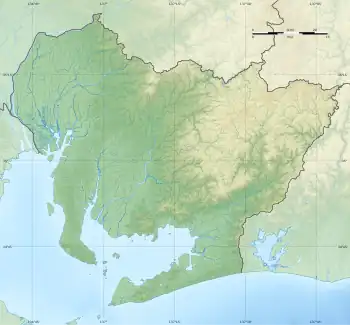Aotsuka Kofun
The Aotsuka Kofun (青塚古墳) is a Kofun period burial mound, located in the Aotsuka neighborhood of the city of Inuyama, Aichi in the Tōkai region of Japan. It was designated a National Historic Site of Japan in 1983.[1] It is the second largest kofun found in Aichi Prefecture after the Danpusan Kofun in Nagoya.
青塚古墳 | |
%252C_zenkei-2.jpg.webp) Aotsuka Kofun | |
 Aotsuka Kofun  Aotsuka Kofun (Japan) | |
| Location | Inuyama, Aichi, Japan |
|---|---|
| Region | Tōkai region |
| Coordinates | 35°19′34″N 136°55′45″E |
| Type | Kofun |
| History | |
| Founded | mid 4th century |
| Periods | Kofun period |
| Site notes | |
| Public access | Yes, on site museum |

Overview
The Aotsuka Kofun is located in the southern part of Inuyama, in western Aichi Prefecture. It is one of tumuli which once formed a kofun cluster in the surrounding area (most of which have now been destroyed). Archaeological excavations have been conducted in 1979 and from 1995 to 1998. [2]
The tumulus is a zenpō-kōen-fun (前方後円墳), which is shaped like a keyhole, having one square end and one circular end, when viewed from above. It has a total length of 123 meters and is orientated to face southwest. It consists of a three-tiered posterior circular portion with a diameter of 78 meters and height of 12 meters, and a two-tier trapezoidal anterior portion, with a width of 62 meters, length of 45 meters and height of seven meters. A surviving portion of a moat is on the west side of the tumulus, and on the east side a raised embankment for crossing the now vanished portion of the eastern moat has also survived. An unusual feature of this kofun is the presence of a rectangular mound on the far end of its anterior portion, which may have been a ceremonial platform. The tumulus was formerly covered in fukiishi across its entire surface, and had rows of cylindrical and drum-shaped haniwa. It is believed to have been built in the middle of the 4th century in the early Kofun period. [2]
The kofun is associated with the Ni-no-miya of Owari Province, Ōagata Shrine, which is located 3.5 kilometers to the east. The shrine claims that the kofun is the grave of its kami, Oarata-no-mikoto (大荒田命). During the Sengoku period, the tumulus was fortified as a castle by the forces of Toyotomi Hideyoshi during the 1584 Battle of Komaki and Nagakute.[2]
The site is now open to the public with the exterior of the tumulus restored to its appearance at the time of construction, with a row of replica pot-shaped haniwa as part of the Aozuka Kofun Historical Park , which also has an on-site museum. It is located about a 30-minute walk from Gakuden Station on the Meitetsu Komaki Line.[2]
Oagata Shrine
| Oagata Shrine | |
|---|---|
 Hime no Miya and Umezono | |
| Religion | |
| Deity | Oarata-no-mikoto (大荒田命)[2] |


Ōagata Shrine is a Shinto shrine located in Inuyama, Aichi.[2][3]
It is the Ninomiya, or a second ranked shrine in Owari Province,[2] ranked below Masumida Shrine..[4]
It is located close to Tagata Shrine the shrine famous for hosting Hōnensai. Oagata shrine has a similar yonic festival the Sunday before this festival[3]
Aotsuka Kofun is located on the grounds of the shrine, 3.5 kilometers to the west of the honden.[2]
The shrine claims that the kofun is the grave of its kami, Oarata-no-mikoto (大荒田命). During the Sengoku period, the tumulus was fortified as a castle by the forces of Toyotomi Hideyoshi during the 1584 Battle of Komaki and Nagakute.[2]
References
- "青塚古墳" (in Japanese). Agency for Cultural Affairs. Retrieved August 20, 2020.
- Isomura, Yukio; Sakai, Hideya (2012). (国指定史跡事典) National Historic Site Encyclopedia. 学生社. ISBN 4311750404.(in Japanese)
- D, John (2012-03-24). "Fertility festival (Oh-agata/ Oagata Jinja)". Green Shinto. Retrieved 2023-04-27.
- Shibuya, Nobuhiro (2015). Shokoku jinja Ichinomiya Ninomiya San'nomiya (in Japanese). Yamakawa shuppansha. ISBN 978-4634150867.
External links
![]() Media related to Aotsuka Kofun (Aichi) at Wikimedia Commons
Media related to Aotsuka Kofun (Aichi) at Wikimedia Commons